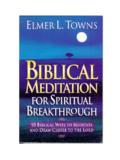Transcription of Icebreakers - The Singles Network Ministries
1 Icebreakers Definition: Something done or said to relax an unduly formal atmosphere or situation; a beginning; a start Help to relax a group of strangers Give people permission to talk to other people they might not otherwise talk to and about things they usually don't discuss Help people get to know each other, finding a personal connection that facilities group interaction Help build group identity and cohesion Get everyone involved quickly Can have a purpose or direction Should be fun and entertaining Are designed to energize the group; build momentum right from the start Can set the tone and pace of the workshop/Bible study/conference, Once a group knows each other, there should not be a need to have another icebreaker.
2 Caution: Never ask anyone what they do for a living (as an icebreaker). 1) Not everyone has a job; 2) Not everyone likes their job; 3) Not everyone feels their job reflects who they are. Allow the person to tell you about their job first. Also, be sensitive to first time questions such as: Have you been married? How many children do you have? Instead ask questions such as where are you from? Are you from this area? How long have you lived here? Seen any good movies lately? Warm-Up Exercises Definition: Typically warm up exercises are designed to point participants towards a specific purpose or direction Are designed for participants where everyone may already know each other and/or after you have had an icebreaker Are designed with specific goals in mind Should increase participants energy and interest Should help participants ease into and feel comfortable with the learning environment, while giving them a glimpse into the key ideas that will be developed as the workshop/Bible study/conference, Can serve as a way for participants to express their reasons for coming and their goals and expectations Sets the tone and pace for the workshop/Bible study/conference.
3 Skits Help to communicate a particular theme for your workshop/Bible study/conference, Can be done in an improv way or with planning Typically have a purpose and focus Designed to be performed prior to a message but can also follow up a message to reinforce it. Are short in nature, require little practice or props Can include all kinds of personalities including those who are fearful of talking in front of others Types of things that can communicate a particular purpose or focus: Poems/Stories/Testimonies Songs/Music/Sounds/Dance Self-portraits/Crafts Movie clips/Powerpoint Decoration/Lighting/Props Food/Smells/Temperature Location/Room layout Greeters Team Building Exercises Help to communicate a particular theme for your workshop/Biblestudy/conference, Have a goal of building your team for a particular purpose such as developing strong leaders, building unity, preparation for growth, preparation for change within the ministry, Are performed at everything from Bible studies, conferences, workshops, to retreats, Sunday school and meetings.
4 Can be very short and specific to long and detailed depending on your goals Can include all kinds of personalities including those who are fearful of talking in front of others Can include all kinds of props such as an egg to a climbing course Can include simple things such as spending time together, playing games or riding on a long trip together Things To Remember Your selection of the right activity depends on -the topic of the workshop/Bible study/conference, -the composition of the group [male/female/young/old/single parent, ]. -the setup of the room [lighting, windows, doors, sound, shape]. -the length of the session -whether participants know each another -and your own personality and style as the teacher and/or trainer Be sensitive to the time of year, holiday, and occasion when picking your Icebreakers /warm-up exercises/skits Not everyone enjoys Icebreakers /warm-up exercises/skits [be sensitive to this and announce that they do not have to participate].
5 When your audience is single adults, be sensitive to male/female pairing; make sure your groupings are at least 3 people You'll want to allow your participants a chance to talk and interact Websites/Books/Great Links Misc. Icebreakers : , Personality styles/conflict exercises: ~amedpub/rc21 Team building exercises: Education Icebreakers : Office Icebreakers /warm-up exercises/topical lead-ins Icebreakers , links and books Ton's of Icebreakers and warm-up exercises, links Ton of Icebreakers and games for youth ministry Tons of Icebreakers Christian skits: ; Book: Ice Breakers & Heart Warmers: 101 Ways to Kick Off and End Meetings, Samples Be creative; several of these can be changed only slightly to have a different direction and theme.
6 Icebreakers 1. INTRODUCE MYSELF: Participants introduce themselves and tell why they are there. Variations: Participants tell where they first heard about the class, how they became interested in the subject, their occupations, home town, favorite television program, or the best book they have read in the last year. 2. INTRODUCE ANOTHER: Divide the class into pairs. Each person talks about him/herself to the other, sometimes with specific instructions to share a certain piece of information. For example, "The one thing I am particularly proud of " After five minutes, the participants introduce the other person to the rest of the class. 3. CHARACTER DESCRIPTIONS: Have participants write down one or two adjectives describing themselves.
7 Put these on a stick- on badge. Have class members find someone with similar or opposite adjectives and talk for five minutes with the other person. 4. I'VE DONE SOMETHING YOU HAVEN'T DONE: Have each participant introduce themselves and then state something they have done that they think no one else in the class has done. If someone else has also done it, the person must state something else until he/she finds something that no one else has done. 5. FIND SOMEONE: Each participant writes on a blank index card one to three statements, such as favorite color, interest, hobby, or vacations. Pass out cards so everyone gets someone else's card. Have that person find the person with their card and introduce themselves.
8 6. FAMOUS PERSON: Participants write a famous name on a piece of paper and pin it on someone else's back. Person tries to guess what name is pinned on his/her by asking others around the room yes or no questions. Variation: Use famous place instead of famous person, or you could use famous single adults (alive/dead). 7. MY NAME: People introduce themselves and tell what they know about why they have their name (their mother wanted to name me after her great aunt Helen who once climbed Pike's Peak in high heels, etc.). It could be the first, middle or nickname. 8. WHAT KIND OF BEAN ARE YOU? Go around the room and ask what kind of bean are you? Lima, Kidney, Human and why? Note: This can also be done as what kind of animal.
9 9. WHAT'S THAT TUNE?: You can have a list of songs for them to hum that most people would know. This is especially fun at Christmas. Give everyone a song to hum making sure at least three people have the same song. They have to hum their way to whoever has the same song. Once they find their other hummers, you can have them ask them what their favorite song is, Christmas carol, Christmas memory, : Other games that are similar would be animal sounds. 10. FINISH THE SENTENCE: Go around the room and have each person complete one of these sentences (or something similar): The best job I ever had The worst project I ever worked on The riskiest thing I ever did This is a good technique for moving on to a new topic or subject.
10 For example, when starting a ministry/team and you want everyone to introduce themselves, you can have them complete "I am in this ministry/team " You can also move on to a new subject by asking a leading question. For example if you are instructing time management, "The one time I felt most stressed because I did not have enough time was ..". 11. SCAVENGER HUNT/BINGO: Class icebreaker where you have a list of items such as Find someone with blue shoes or Find someone who has been to Alaska or Find someone who speaks a foreign language . You can provide a list of questions and have people sign their name beside a question, or you can layout the game like Bingo and the first person to get five across or down, Your game can have a theme or be random.




